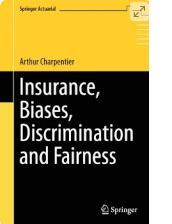Fairness of predictive models: an application to insurance markets
This project is led by Arthur Charpentier, Professor in the Department of Mathematics
at the University of Quebec in Montreal.
Duration of the project: 2023-2026
This project addresses biases within the automatic artificial intelligence algorithms utilized to determine optimal pricing in individual policies. Its aim is to mitigate or eliminate such biases, which could lead to inequities or discriminatory practices based on factors such as gender, race, religion, or origin in the coverage provided by insurers or reinsurers to policyholders.
The research topic has both theoretical significance, as it involves enhancing control over the "black box" nature of AI-based models, and practical importance, as it aims to reduce risks associated with discrimination and inequality. Given the increasing influence of social networks and the consequential reputational challenges faced by insurers and reinsurers, this issue is particularly relevant and timely.
Fields of research / technical cooperation
Actuarial science
 Arthur Charpentier, PhD, Fellow of the French Institute of Actuaries*, is full professor at UQAM, Montreal, Canada, and Université de Rennes, in France. He is member of the editorial board of the Journal of Risk and Insurance, the ASTIN Bulletin, and Risks. He edited, a few years ago, Computational Actuarial Science with R (CRC), and more recently wrote Insurance, Biases, Discrimination and Fairness (Springer). He is also the former director of the Data Science for Actuaries program of the French Institute of Actuaries. He is a Louis Bachelier Fellow, and his recent work is about climate change and predictive modeling insurance, more specifically in the context of fairness and discrimination.
Arthur Charpentier, PhD, Fellow of the French Institute of Actuaries*, is full professor at UQAM, Montreal, Canada, and Université de Rennes, in France. He is member of the editorial board of the Journal of Risk and Insurance, the ASTIN Bulletin, and Risks. He edited, a few years ago, Computational Actuarial Science with R (CRC), and more recently wrote Insurance, Biases, Discrimination and Fairness (Springer). He is also the former director of the Data Science for Actuaries program of the French Institute of Actuaries. He is a Louis Bachelier Fellow, and his recent work is about climate change and predictive modeling insurance, more specifically in the context of fairness and discrimination.
Alma mater: MSc in actuarial science ENSAE (1999, Paristech, France), MSc in mathematical economics Paris Dauphine (1999, PSL, France), PhD in applied mathematics KU Leuven (2006, Belgium), HDR* in applied mathematics Université de Rennes (2016, France). Arthur Charpentier - Curriculum Vitae Arthur Charpentier - Blog

Insurance, Biases, Discrimination and Fairness (Springer)
Overview of the book
Author: Arthur Charpentier
• An account of fairness in predictive models
• Discusses fairness issues arising from big data and algorithms
• Addresses a topic of high interest to actuaries and regulators
Project activities & events
Paper (FR) - "Certitudes collectives et incertitudes individuelles, les données massives changent-elles la donne ?" by Arthur Charpentier - October 2025
Paper (EN) - Abstract - "Perceived Fairness in Networks" by Arthur Charpentier - October 2025
Paper (FR) - "Un cadre de gouvernance à trois piliers pour une tarification équitable de l’assurance" by Arthur Charpentier, Marie-Pier Côté and Olivier Côté - October 2025 | Chaire PARI Working paper, to be presented at the Chaire PARI Seminar (online, November 2025).
Paper EN - "A Scalable toolbox for exposing indirect discrimination in insurance rates" by Olivier Côté, Marie-Pier Côté and Arthur Charpentier - October 2025 | CAS (Casualty Actuarial Society) Working paper, to be presented at the CAS Annual Meeting (Austin, Texas, US November, 2025); CAS Canada Connection, (Toronto, December, 2025); and 1st ASTIN Bulletin Conference (Zurich, January 2026).
Article (EN) - "Ensuring Reliable and Transparent Algorithmic Fairness Through Optimal Transport and Uncertainty Quantification", article published | Proceedings of the AAAI Conference on Artificial Intelligence - August 2025
Article (EN) - "Beyond Shapley Values: Cooperative Games for the Interpretation of Machine Learning Models", article published by Cornell Universty / ARXIV - June 2025
Article (EN) - "Disaster Risk Financing through Taxation: A Framework for Regional Participation in Collective Risk-Sharing", article published by Cornell Universty / ARXIV - June 2025
Article (FR) - "À la fin, qui prendra en charge le coût des assurances ?" | The Conversation - August 27, 2025
Article (FR) - "Des primes d’assurance personnalisées moins chères grâce à l’IA ? Voici pourquoi il s’agit d’une pente glissante" | The Conversation - August 5, 2025
Article (FR) - "Les événements climatiques extrêmes ne sont plus des risques marginaux, et le secteur bancaire tarde à en prendre la mesure"| Le Monde - July 7, 2025
Article (EN) - "Sequential Conditional Transport on Probabilistic Graphs for Interpretable Counterfactual Fairness", article published | Proceedings of the AAAI Conference on Artificial Intelligence - April 2025
Article (EN) -"Moral Maze", article published by the Actuary, magazine of the Institute and Faculty of Actuaries (IFoA) in the UK - March/April 2025
Article (EN) - "EquiPy: Sequential Fairness using Optimal Transport in Python", article / python codes - March 2025
Article (EN) -"Mitigating Discrimination in Insurance with Wasserstein Barycenters", article published in the Machine Learning and Principles and Practice of Knowledge Discovery in Databases (ECML PKDD 2023) - February 2025
Article [FR] - "Incendies à Los Angeles : « La situation actuelle menace non seulement le marché de l’assurance, mais aussi l’économie californienne, dans son ensemble »" - Le Monde - January 2025
Paper (EN) - Abstract - "Selection bias in insurance: why portfolio-specific fairness fails to extend market-wide" by Olivier Côté, Marie-Pier Côté and Arthur Charpentier - December 2024
- Paper (EN) - "Insurance analytics: prediction, explainability and fairness" - Arthur Charpentier wrote, with Kjersti Aas (Norwegian Computing Center & Norwegian University of Science and Technology), Fei Huang (University of New South Wales) and Ronald Richman (Old Mutual Insure and University of the Witwatersrand) the editorial of the new volume of Annals of Actuarial Science - December 2024
- Paper (EN) - "Post-Calibration Techniques: Balancing Calibration and Score Distribution Alignment" - Agathe Fernandes Machada presented recent work at a workshop at the Thirty-Eighth Annual Conference on Neural Information Processing Systems (also known as NeurIPS 2024) - Poster - December 2024
Presentation (EN) - "Balance and Calibration of Probabilistic Scores From GLM to Machine Learning", 60th Actuarial Research Conference, Toronto (Canada) - July 29 - August 1, 2025
Presentation (EN) - "Fairness and Discrimination of Predictive Models A Spectrum of Fair Premiums, an Introduction", 60th Actuarial Research Conference, Toronto (Canada) - July 29 - August 1, 2025
Presentation (EN) - "Discrimination and Interpretability of Predictive Models" ("Discrimination et interprétabilité des modèles prédictifs") for the Institut Luxembourgeois des Actuaires - May 2025
Presentation (EN) - "Using optimal transport to mitigate unfair predictions and quantify counterfactual fairness" Academic Seminar, University of Toronto - March 2025 | Presentation (EN) - Université de Lausanne - May 2025 | Presentation (EN) - Mathematics Colloquium at Centro de Investigación en Matemáticas (CIMAT) - February 2025
Presentation (FR) - "IA, biais et équité (en actuariat et en assurance)", Association des Masters en Actuariat - February 2025. Read more (LinkedIn)
Annual Conference of the Canadian Econometrics Study Group (EN) - Abstract - "Calibration of Probabilistic Scores of Classifiers" - December 2024 - Conference based on the two following papers:
• Paper #1 - "From Uncertainty to Precision: Enhancing Binary Classifier Performance through Calibration" - February 2024
• Paper #2 - "Probabilistic Scores of Classifiers, Calibration is not Enough" - August 2024Presentation (EN) - "Demystify fairness and discrimination in insurance, and avoid some pitfalls" - Arthur Charpentier was invited to give a talk at the Financial Conduct Authority (FCA) - Seminar, London, UK - November 2024
Presentation (EN) - "Optimal transport and fairness of predictive models" - Keynote Presentation - SCAI Workshop (Sorbonne Center for Artificial Intelligence) - September 2024
Colloque au Centre Culturel International de Cerisy (FR) - Abstract - "Certitudes collective et incertitudes individuelles, les données massives changent-elles la donne ?" - Cerisy-la-Salle, France - September 2024
- ACP Conference (EN) - "From contemplative to predictive modeling in actuarial science and risk management" - KU Leuven - July 2024
SCOR Foundation Workshop (EN) - Paris, May 15, 2025 - "Confidence and Fairness: Scientific Foundations in AI and Risk" - News (EN) | Program (EN)
IME Workshop on decentralized insurance and risk sharing (EN) - "Collaborative insurance, unfairness, and discrimination" - 27th Congress on Insurance: Mathematics and Economics (IME) Chicago - July 2024
- SCOR Foundation Interview (EN) - "Fairness of predictive models: an application to insurance markets", interview with Arthur Charpentier about the project - June 2025
- SCOR Foundation Webinar (EN) - "AI and Econometrics" with Arthur Charpentier - June 18, 2025
- Institut des actuaires Webinar (FR) - "Éthique et Discrimination" for the Institut des Actuaires - May 2025
- The European Actuary Interview (EN) - "Actuarial ethics and the future of the profession" - Arthur Charpentier gave an interview to Jennifer Baker, for The European Actuary, volume 40 - December 2024
- SCOR Foundation Webinar (EN) - "Scope and limits of artificial intelligence" - May 15, 2024
Newsletter #4 (EN) - SCOR-UQAM Fairness and Insurance Project Newsletter - September 2025
Newsletter #3 (EN) / Infolettre #3 [FR] - SCOR-UQAM Fairness and Insurance Project Newsletter - April 2025
Newsletter #2 (EN) - SCOR-UQAM Fairness and Insurance Project Newsletter - September 2024
Newsletter #1 (EN) - SCOR-UQAM Fairness and Insurance Project Newsletter - March 2024
Annual Research Report (EN) - SCOR-UQAM Fairness and Insurance Project, Report #2 - Project Research Results - Authors: Arthur Charpentier (Principal Investigator), Professeur UQAM - 2025
During its second year, the project consolidated and expanded its contribution to the fairness of predictive models in insurance. Building on the 2024 results, the research team advanced methodological work by extending sequential counterfactual fairness to more complex probabilistic frameworks, improving calibration techniques, and designing optimal-transport based post-processing methods to reduce both group and individual unfairness. Particular attention was given to proxy discrimination and to balancing interpretability with predictive performance, in order to ensure that the proposed approaches remain directly applicable to actuarial practice. These advances were presented at the 2025 SCOR Foundation workshop “Confidence and Fairness: Scientific Foundations in AI and Risk”, which gathered researchers and practitioners around the themes of fairness, transparency, and trust in algorithmic decision-making. Beyond technical progress, dissemination was also a key priority: the team presented at leading international conferences and published in both practitioner journals and more general outlets, thereby reaching a wider audience. Together, these initiatives confirm the project’s ambition to connect rigorous theoretical research with the practical challenges of implementing fair and responsible AI in insurance.
Annual Research Report (EN) - SCOR-UQAM Fairness and Insurance Project, Report #1 - Project Research Results - Authors: Arthur Charpentier (Principal Investigator), Professeur UQAM - 2024
This project, led by Professor Arthur Charpentier from the University of Quebec in Montreal, runs from 2023 to 2026. It focuses on addressing biases in automated artificial intelligence algorithms used to determine optimal pricing in individual insurance policies. The goal is to mitigate or eliminate these biases, which could result in inequities or discriminatory practices based on factors like gender, race, religion, or origin in the coverage offered by insurers or reinsurers to policyholders. More broadly, it tackles challenges related to the personalization of insurance pricing in the context of opaque models, considering the implications for insurance companies, the global insurance market, and issues of welfare and fairness.